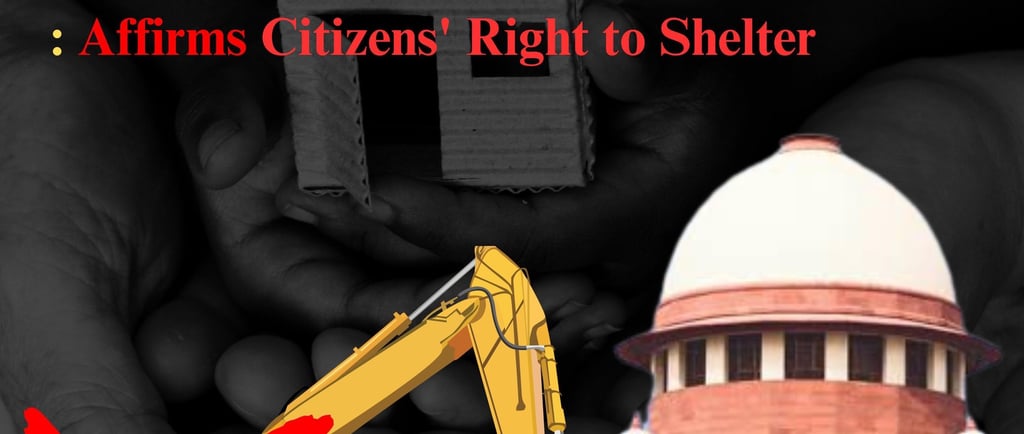Supreme Court Strikes Down Arbitrary Demolitions: Affirms Citizens' Right to Shelter
the Supreme Court of India has delivered a resounding verdict against the arbitrary demolition of properties, underscoring the constitutional guarantee of the right to shelter. The judgment comes in response to a series of writ petitions challenging the demolition of residential and commercial properties without following due legal processes.
11/13/20242 min read


New Delhi – In a landmark judgment, the Supreme Court of India has delivered a resounding verdict against the arbitrary demolition of properties, underscoring the constitutional guarantee of the right to shelter. The judgment comes in response to a series of writ petitions challenging the demolition of residential and commercial properties without following due legal processes.
Background of the Case
The case revolved around the demolition of properties belonging to individuals accused of criminal offenses. Petitioners argued that such demolitions were punitive actions, violating the rule of law and constitutional rights, particularly the right to shelter under Article 21. The court was tasked with determining whether executive authorities could unilaterally demolish properties linked to accused persons as a form of punishment.
Justice B.R. Gavai, delivering the judgment, reflected on the intrinsic value of a home, quoting poet Pradeep: "To have one’s own home, one’s own courtyard – this dream lives in every heart."
The Rule of Law and Separation of Powers
The court reaffirmed the foundational principle of the rule of law, emphasizing that no individual or authority is above it. Justice Gavai highlighted that any action infringing on fundamental rights must be subjected to judicial scrutiny. The judgment elaborated on the doctrine of separation of powers, emphasizing that executive authorities cannot usurp judicial functions by preemptively penalizing individuals through property demolitions.
Citing precedents, the judgment declared that "where the rule of law is absent, there is no accountability, and abuse of power prevails." It noted that the judiciary plays a pivotal role in safeguarding citizens' rights against such excesses.
Doctrine of Public Trust and Accountability
The judgment invoked the doctrine of public trust, asserting that government officials act as trustees of public interest. Any breach of this trust, especially actions carried out in bad faith or with ulterior motives, would attract strict scrutiny. The court directed that officials responsible for unlawful demolitions must face disciplinary action and be held accountable for their decisions.
Guidelines for Demolition Procedures
To prevent misuse of power, the court laid out comprehensive guidelines for property demolitions:
Issuance of Show Cause Notices: Demolition notices must detail the grounds for action, relevant laws, and provide adequate time for owners to respond.
Right to Hearing: Property owners must be granted a fair hearing before any demolition order is executed.
Judicial Oversight: No demolition should proceed without judicial review, ensuring that actions are neither arbitrary nor discriminatory.
Compensation for Illegal Demolitions: Victims of unlawful demolitions are entitled to compensatory damages, including costs for rebuilding and mental anguish.
Implications for State Governments
The court directed all state governments to strictly adhere to the new guidelines, cautioning against targeting properties based on alleged criminal affiliations. The judgment criticized actions that disproportionately affect marginalized communities, labeling such practices as discriminatory and unconstitutional.
Public Reaction and Legal Significance
Legal experts have hailed the verdict as a monumental step toward upholding human rights and curbing state excesses. Senior Advocate Abhishek Manu Singhvi, representing one of the petitioners, termed it a "victory for the rule of law." Activists and civil society organizations have welcomed the decision, urging its swift implementation nationwide.
Conclusion
The Supreme Court's ruling reinforces the principle that even in the face of criminal allegations, the state cannot bypass due process. By affirming the right to shelter as sacrosanct, the court has sent a strong message against the misuse of power, ensuring that the dreams of countless citizens for a secure home are not shattered by arbitrary state actionsy
